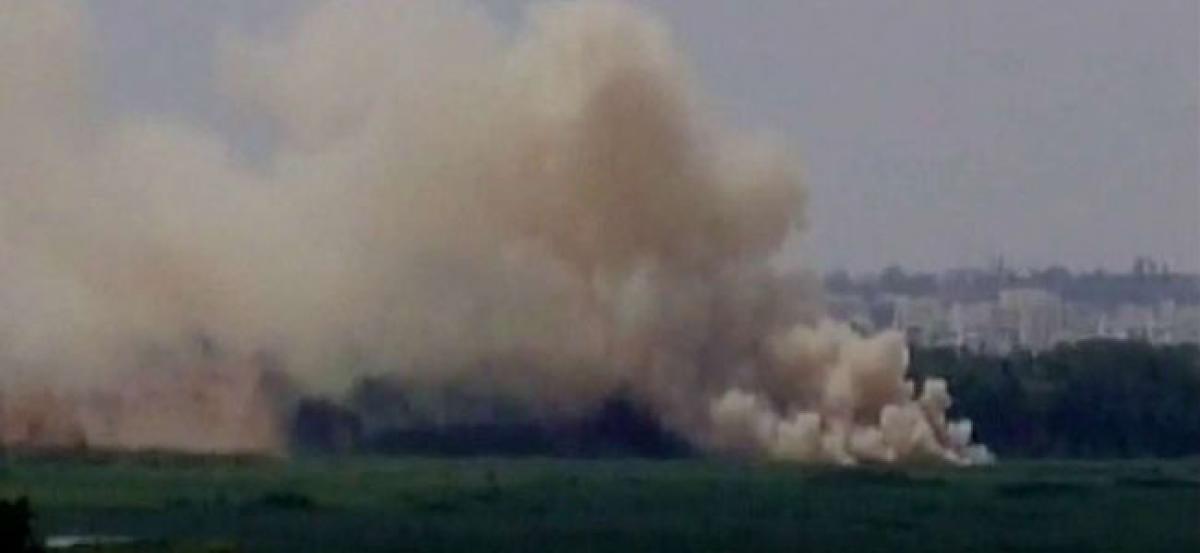Live
- BJP questions Congress-Shiv Sena (UBT) alliance over Aaditya Thackeray's Savarkar-Nehru remark
- Maha Oppn to boycott customary CM tea meet, cites rising farmers' distress, atrocities against Dalits
- Mikheil Kavelashvili is new Georgian President
- He makes things look easy: Smith on 241-run partnership with Head
- Decline in TB cases & deaths in India ‘remarkable’, shows ‘political commitment’, says former WHO Director
- PKL 11: Delhi dedicates win over Haryana to ‘junior express’
- Cyclone kills 14 in French territory Mayotte
- 3rd Test: Head, Smith centuries flatten India on Day 2
- AAP Announces Final Candidate List For 2025 Delhi Assembly Elections, Kejriwal To Contest From New Delhi
- Bangladesh unrest has delayed execution of some vital projects: Tripura CM
Just In

Indiscriminate discharge of untreated sewage into Bengaluru\'s Bellandur lake has resulted in an \"environmental emergency\", a committee has told the National Green Tribunal, adding that there is not even one millilitre of clean water in the lake.The NGT-mandated committee said the biggest lake of the beautiful city of Bengaluru had become the largest septic tank of the city due to \"sheer callousne
Indiscriminate discharge of untreated sewage into Bengaluru's Bellandur lake has resulted in an "environmental emergency", a committee has told the National Green Tribunal, adding that there is not even one millilitre of clean water in the lake.The NGT-mandated committee said the biggest lake of the beautiful city of Bengaluru had become the largest septic tank of the city due to "sheer callousness and indifference" of the authorities.
"According to the material collected, the water holding capacity of Bellandur lake has rapidly shrunk due to indiscriminate dumping of construction and demolition waste, municipal solid waste and due to vast spread of hydrophyte and microphytes in the lake water.
Hydrophytes are aquatic plants that grow in or near water and provides cover for fish and other aquatic organisms.
"The commission during the inspection was shocked to notice a road that has been constructed on the Varthur lake by dumping construction and demolition waste under the garb of laying a pipeline," the report, filed by the three-member committee, said.
The report, filed by the committee comprising senior advocate Raj Panjwani and advocates Sumeer Sodhi and Rahul Chaudhary, also states that Bellandur lake has caught fire 12 times since the first incident on August 12, 2016.
"During the inspection of Bellandur lake, it came to the commission's notice that the storm water drain outlets near the lake were discharging nothing but sewage and effluent and the same was being released into the so-called lake.
"After an almost circumferential tour of the lake, the commission further observed that there is not even one millilitre of clean water in the lake, but the same was filled up with sewage, effluent, solid waste, weed, debris, etc.," the report said.
An estimated 480 million litres per day (MLD) of sewage from Bellandur lake flows into Varthur lake and in addition, approximately 60-70 MLD of additional sewage flow from the local storm water drains.
"The commission during its visit observed that the condition of Varthur lake is no better, in fact worse than Bellandur lake in almost every aspect from fire to froth and from sewage to stink. Varthur is an aggravated calamity by the sheer volume of filth that is dumped in it without any ecological sensitivity," it said.
The committee has also recommended that CCTVs should be installed at appropriate locations for ensuring that no construction and debris waste is dumped in the buffer zone area of the lake.
"Security guards should be deployed at the most vulnerable locations to keep vigilance on illegal dumping of debris and to prevent encroachment activities.
"In case anyone is found to be dumping construction and debris waste or debris into the lake or its buffer zone, a penalty of Rs 5 lakh be imposed for each offence," it said.
The panel has recommended constitution of a task force of experienced senior officers consisting of Bangaluru Development Authority, Karnataka State Pollution Control Board, Central Pollution Control Board and others for strict and timely implementation of the suggestions.
The NGT had earlier slammed the Karnataka government over its action plan on Bengaluru's Bellandur lake and formed a committee to inspect the lakes in the city.
On January 29, the green panel had directed Indian Institute of Science (IISc) in Bengaluru to carry out a pilot study on the visible aquatic plants.
Earlier, the green panel had come down heavily on the Karnataka government for not taking active measures to prevent recurring incidents of fire at the severely polluted Bellandur lake.

© 2024 Hyderabad Media House Limited/The Hans India. All rights reserved. Powered by hocalwire.com







